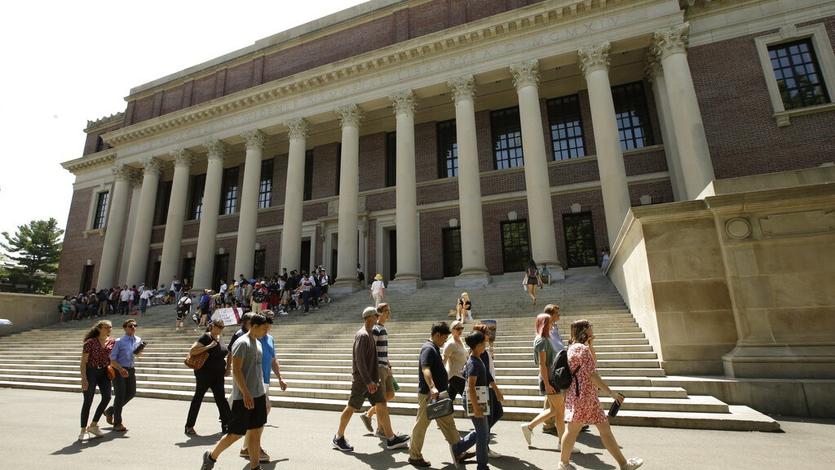 In this July 16, 2019, file photo, people walk past an entrance to Widener Library on the campus of Harvard University, in Cambridge, Massachusetts. (STEVEN SENNE / AP)
In this July 16, 2019, file photo, people walk past an entrance to Widener Library on the campus of Harvard University, in Cambridge, Massachusetts. (STEVEN SENNE / AP)
Sources told China Daily that Washington has kept playing a hypocritical, double-faced role in China-US education exchanges this year, as it encouraged US universities to enroll more Chinese students while failing visa applications from over 500 Chinese students who had obtained offers to pursue postgraduate study in STEM majors.
About a quarter of these students have won US scholarships, and the majority submitted visa applications after the new US administration took office, sources familiar with the matter told China Daily, on the condition of anonymity.
The affected Chinese students were applying for doctorates or master's degrees in the US, and most focused on science and technology majors, including electronic engineering, computers, mechanics, chemistry, material science and biomedicine, according to the sources.
The US universities they plan to attend include Harvard, Yale, the University of California Berkeley, Massachusetts Institute of Technology and Johns Hopkins.
According to data provided by US academic institutions, visa frustrations of this kind will affect about 3,000 to 5,000 Chinese STEM students pursuing postgraduate study or Chinese visiting scholars in STEM majors every year
However, the US embassies and consulates in China rejected their visa applications, saying they did not comply with Section 212 (f) of the Immigration and Nationality Act and Presidential Proclamation 10043.
ALSO READ: Education is collateral damage of rising tensions
The proclamation accuses the Chinese government of using its overseas students to acquire sensitive US technologies and intellectual property, and it suspends entry of those Chinese students and researchers who Washington defines as being connected to China's "Military-Civil Fusion Strategy".
Some of these students have co-signed a letter urging the US government to tackle this discrimination and suppression issue targeting Chinese students.
The US government's suppression of Chinese students and scholars has also prompted concerns in US education and academic circles.
On June 10, the American Council on Education and other US higher education organizations requested a briefing on the implications of Proclamation 10043 from the State Department, specifically from representatives of the Bureau of East Asian and Pacific Affairs, the Office of Consular Affairs, and the Bureau of International Security and Nonproliferation.
According to data provided by US academic institutions, visa frustrations of this kind will affect about 3,000 to 5,000 Chinese STEM students pursuing postgraduate study or Chinese visiting scholars in STEM majors every year.
As early as June 2019, the Chinese Ministry of Education issued an alert on studying in the US in response to the Donald Trump administration's suppression of Chinese students.
After Trump signed Presidential Proclamation 10043 on May 29 last year, Foreign Ministry spokesman Zhao Lijian responded by saying, "this action is stark political persecution and racial discrimination" and a grave violation of the legitimate rights and interests of Chinese students and researchers in the US.
Such a move goes against the trend of the times in international talent exchange and "will gravely impact the normal cultural and personnel exchange between the two countries", Zhao said, adding that Washington should immediately retract its wrong decision, and respect and protect the legitimate rights and interests of Chinese students in the US.
READ MORE: US move a disservice to academics
However, since Joe Biden took office as the new US president, there still have been cases taking place affecting Chinese scholars and foreign students, the anonymous sources told China Daily.
The citizens involved were faced with situations such as visa application rejection; prolonged body search, interrogation and even repatriation at the US airports; harassment during their stay in the US and unjustified detention or interrogation by US national security authorities, sources said.
Given the fact that US embassies and consulates in China resumed operations for student visa applications in early May, Washington has attempted to look like it is responding to the urges of US universities to attract a large number of Chinese students and ensure tuition income, thus showing a gesture of cooperating with China in education, the sources noted.
"But, on the other side, it continues the Trump administration's erroneous policy of suppressing Chinese postgraduate students and scholars in STEM majors and seriously violates the legitimate rights and interests of Chinese citizens studying abroad," the sources added.
The sources urged Chinese students and scholars planning travel to the US to "examine the recent series of outrageous moves by the US and get a clearer picture about the crux of the US government's policy, which is to step up suppression on China-US people-to-people exchanges".
These Chinese students and scholars are expected to "make an objective and rational assessment of, and an estimation from, visiting and studying in the United States so as to avoid unnecessary losses", the sources added.


